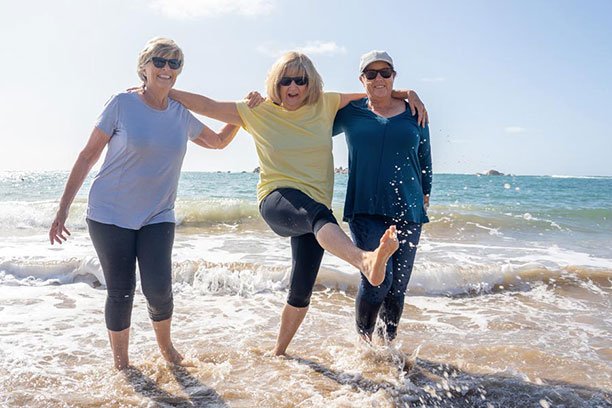Chronic fatigue syndrome (CFS)

What is fatigue?
Chronic fatigue syndrome (CFS) – profound exhaustion – is described as a primary accompanying symptom in many severe illnesses. It frequently arises, for example, during or after cancer treatment, with chronic diseases such as rheumatism or multiple sclerosis, or even with anaemia.

We speak of long- or post-COVID when the symptoms of a coronavirus infection are still present or undergo change, but do not improve after 12 weeks or longer. According to current studies, approximately 15 % of persons infected with the coronavirus are affected. What has proven to be helpful until now? How can the recovery process be supported?
How is fatigue recognised?
There is a whole host of accompanying symptoms that encapsulate the syndrome. These include:
- Limitation of physical but also emotional functions
- Concentration problems
- Difficulty finding words
- Premature exhaustion without significant prior exertion
- Shortness of breath occurring with minimal strain
- Negative effects on social relationships
- Sometimes even a loss of zest for life
Both the body as well as the psyche are affected to a large extent by chronic fatigue syndrome. It arises suddenly and without warning, even when the person has not exerted themselves. This places a limit on quality of life.
What helps to reduce fatigue?
“Just resting” and sleeping do not help. On the contrary, a combination of light strength and endurance exercises several times a week, under supervision, have proven to be helpful. However, a doctor must be consulted ahead of time as overexertion must be absolutely avoided in order to prevent a worsening of symptoms. Affected persons should increase the scope and intensity of the exercises slowly. Types of exercises that would be well suited for this purpose could be yoga, rehabilitation exercises, swimming, Nordic walking, biking and dancing. Professional counselling should also be considered as fatigue has a significant effect on both body and mind. 3
A meta study of more than 56 individual studies, involving more than 4000 participants, demonstrated that physical activity had a positive effect on the person’s general condition.4
Countering fatigue with proper breathing
In a study of 23 cancer patients in Japan, those patients who dedicated 10 minutes a day to a special breathing technique for the slowing and deepening of the respiration, suffered less from fatigue by the end of the study.5 A similar study investigated the effect of physical activity combined with breathing exercises on 35 patients with fatigue: 30 minutes a day for six consecutive weeks. Fatigue symptoms decreased markedly among the trial group.6
Even among COPD patients, the effects of relaxing breathing exercises had a noticeable effect on the previously-identified fatigue.7 Overall, it was possible to ascertain that targeted, slowed-down and deepened abdominal breathing had a positive effect both mentally and physically. In this sense, one solution approach could be a combination of respiratory therapy and respiratory training. The respiratory muscles can be exercised when working against resistance. Light vibrations loosen any phlegm so they can be coughed out more easily. The RC-FIT® CLASSIC, a globally unique respiratory muscle trainer and respiratory physiotherapy device in one, has been developed for a more simple and effective use. It offers multiple functions, it is easy to handle, and can improve a person’s constitution.
Respiratory therapy and respiratory training with oscillations and sounds
Quellen:
1 Blesch KS, Paice JA, Wickham R et al.: Correlates of fatigue in people with breast or lung cancer. Oncology Nursing Forum. 1991 Jan–Feb;18(1): 81–87. PMID: 2003120
2 Charité Fatigue Centrum, 2022: Post-Covid-Fatigue. Abgerufen über https://cfc.charite.de/fuer_patienten/post_covid_fatigue/ am 06.05.2022
3 Deutsche Fatigue Gesellschaft: Die Erkrankung Fatigue: Symptome, Behandlung, Umgang. Abgerufen über https://deutsche-fatigue-gesellschaft.de am 06.05.2022
4 Cramp F, Byron-Daniel J: Exercise for the management of cancer‐related fatigue in adults. Cochrane Database of Systematic Reviews 2012, Issue 11. Art. No.: CD006145. DOI: 10.1002/14651858.CD006145.pub3. Accessed 06 May 2022
5 Hayama & Inoue, 2012: The effects of deep breathing on ‘tension-anxiety’ and fatigue in cancer patients undergoing adjuvant chemotherapy, Complementary Therapies in Clinical Practice, Volume 18, Issue 2, 2012, Pages 94–98, ISSN 1744-3881, https://doi.org/10.1016/j.ctcp.2011.10.001
6 Kim, S. D., & Kim, H. S. (2005): Effects of a relaxation breathing exercise on fatigue in haemopoietic stem cell transplantation patients. Journal of clinical nursing, 14(1), 51–55.
7 Zakerimoghadam M, Shaban M, Kazemnejad A, Tavasoli Kh: The effect of breathing exercises on fatigue level of COPD patients. Journal of Hayat. 2006; 12 (3) :17–25.
Subscribe to our
BREATHE EASY Newsletter
Tips and information on healthy airways!
- for all who wish to breathe better
- free of charge and convenient e-mails
- compact newsletter once a month
For all those who deal with pneumological topics related to the respiratory tract in a professional context, please find here the subscription to the CEGLA FACHNEWSLETTER.


